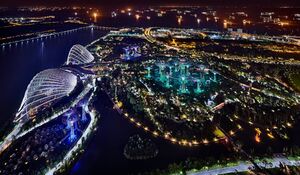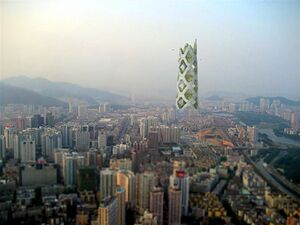User:Apuni: Difference between revisions
| Line 176: | Line 176: | ||
Primary City: Kailua (Capital of the Dominion) | Primary City: Kailua (Capital of the Dominion) | ||
[[File:Kailua skyline at night.jpg|300px|thumb| | [[File:Kailua skyline at night.jpg|300px|thumb|right|Kailua city center at night.]] | ||
Revision as of 23:05, 13 September 2023
The Dominion of Apuni Apuni | |
|---|---|
|
Flag | |
| Map of Apuni Map of Apuni | |
| Capital | Kailua |
| Demonym(s) | Apunian |
| Government | Republic |
| Hui Nui | |
| Hui Kanaka | |
| Population | |
• Estimate | 14,710,000 |
| Currency | Shells |
This article is incomplete because it is pending further input from participants, or it is a work-in-progress by one author. Please comment on this article's talk page to share your input, comments and questions. Note: To contribute to this article, you may need to seek help from the author(s) of this page. |
Apuni is a country on Eurth.
(Introduction to the Dominion)
Geography
The Dominion of Apuni consists of five primary and two secondary islands at the trailing end of the Southern Meteorolas Island chain.
Waimanalo
Primary City: Kailua (Capital of the Dominion)
Pokai (Gambling and tourism center)
Paia
Mokulau
Primary City: Nanaluki
Kaha
Kaneapua
Primary City: Pahoa
Kapa'a
Kuloa
Punalu'u
Primary City: Ha'ena
Ka'ena
Waikapu
Aki
Primary City: Malaekahana
(Outpost - WIP)
(Volcanic Island - WIP)
History
(WIP)
Governance
(WIP)
The Dominion is a democratic federation, consisting of a legislative, executive, and judicial branches. The Dominion's legislative branch is bi-cameral, consisting of two chambers, the lower chamber known as the "Hui Kanaha" (the People's Assembly) and the upper chamber known as the "Hui Nui" (the "Chiefs' Council").
Legislative Branch
The Hui Kahana is elected based on a proportional representation system. Every five years, each citizen votes on candidates from the competing political parties and the outcome determines the number of junior representatives of each district. The Huk Kahana total representation is adjusted periodically to ensure it remains proportional to the population. The Kahana is responsible for drafting and passing legislation related to national policies, budgets, and other matters which affect the entire nation. They serve a fixed term of four years, staggered for re-election every two years. The Hui Nui is composed of senior representatives who are elected by each of the Dominion's territories (also known as administrative regions), regardless of population. The Nui focuses on maters related to individual territories, including local governance, territorial management, and regional development. They also play a significant role in reviewing and amending legislation proposed by the Hui Kahana.
Executive Branch
The Apunian head of state is the "Chief Executive".
Judicial Branch
The Judicial branch is known as the "Judges' Bench" (or just the "Bench").
Politics
(WIP)
The Dominion has six notable political parties, with two primary parties and four minor parties.
The Mercantilist Party
(The centrist-conservative party)
The New Horizon Party
(The centrist-liberal party)
The Sacred Land Party
Otherwise known as the Ecology party, the Kaiola places an emphasis on stewardship of the natural environment of the Dominion.
The Kala Party
Translated as the "money" party, this group focuses mainly on aggressive development of business interests within and outside of the Dominion. This party is well-funded by business interests, but have a somewhat questionable reputation.
The Reformist Party
(The Far-left Party)
The Haipule
(The "religous right" party)
Economy
(WIP)
The Dominion of Apuni currently has a thriving, multi-faceted economy, including:
Industries
Tourism and Gambling
The Dominion's natural beauty, white sand beaches, and vibrant culture have made it a popular tourist destination. The tourism sector complements its lucrative gambling industry by providing jobs and revenue from visitors.
Banking and Financial Services
Apuni has a thriving financial services sector which compliments its stringent banking laws and offshore accounts, contributing to its economic prosperity.
Information Technology
Apuni is known for its cutting-edge technology sector, with a focus on software development, data analytics, and cybersecurity. The Dominion has attracted tech companies, entrepreneurs, and innovators from around the world due to its favorable business environment and talented workforce.
Maritime Trade and Logistics
Situated strategically at the crossroads of major shipping routes, Apuni boasts a busy ports and a well-developed logistics infrastructure. The Dominion is a global hub for trade and servers as a transshipment point for goods travelling between continents, contributing significantly to its economy.
Sustainable Aquatic Agriculture
The Apuni have invested heavily in sustainable aquatic agriculture, specializing in the culvation of seaweed, oysters, and other marine delicacies. Using eco-friendly and responsible farming practices, the island has become a leader in maritime agriculture, supplying both domestic and international markets.
Specialty Agricultural Products
Economic Policies
Low Taxation
Sustainability Initiatives
Infrastructure Development
International Trade Partnerships
Military
(WIP)
As an island chain, the Dominion places a substantial focus on its naval forces. As it's largest armed entity, it consists of disparate branches, each with its own unique focus.
(Provides primary defense for the territorial islands of the Dominion.)
(Works to ensure safe passage for merchant vessels within Dominion seaways and extending to peripheral waterways.)
Ecological Corps
(The branch focused on maintaining ecological security and enforcing ecological regulations and integrity.)
The Dominion Marines
(The ground forces of the Dominion, which focus on jungle & island warfare, including sea-to-shore assaults.)
The Dominion Air Corps
(The aero branch of the Dominion, frequently working in concert with the other two branches of the Dominion military.)
Cultures
(WIP)




